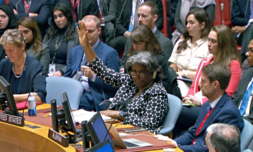The ICC’s top prosecutor recently stated his intention to seek arrest warrants for Israel and Hamas leaders associated with the war in Gaza. Yet, the court’s history of challenges raises doubts about its effectiveness in convicting war criminals.
The International Criminal Court (ICC), established in 2002, is a judicial institution dedicated to investigating, prosecuting, and trying individuals charged with genocide, war crimes, and crimes against humanity.
With over 120 member countries, the ICC aims to end impunity for these crimes and help prevent them, acting as a last resort when national courts cannot or will not act.
Recently, the organisation has been in the limelight after its top prosecutor Karim Khan announced his intentions to seek arrest warrants for Israeli Prime Minister Benjamin Netanyahu, Defense Minister Yoav Gallant, Hamas leader Yahya Sinwar, and other figures involved in the Israel-Hamas war.
The ICC’s unprecedented decision to target leaders of a Western-allied state like Israel has sparked outrage from some leaders, who deny its validity. Advocates of international justice, however, commend the ICC’s commitment to accountability for all.
Nonetheless, the ICC’s history has led many to question its effectiveness and whether its efforts will bear weight.
The warrants sought after
The court is currently assessing whether there is sufficient evidence of war crimes committed by both Israeli and Hamas leaders to issue such warrants.
Khan mentioned that there were sufficient grounds to hold the leaders responsible for their crimes through the war. The basis of the warrants are allegations of the starvation of civilians and intentionally directing attacks against a civilian population.
If granted, any of the 124 ICC member states are obliged to arrest the accused if they are on state soil. Until then, neither of the leaders will stand trial unless they are in the court’s custody, especially since the organisation lacks a force under its own authority to arrest perpetrators.
Yet, even if issued, these warrants will not guarantee a change in the the direction of the war, due to the ICC’s lack of jurisdiction in Israel.
Unsurprisingly, the move by Khan has sparked outrage from Israel, with Netanyahu calling the ICC prosecutor one of the ‘great antisemites in modern times’.
The US has also backed Israel in rejecting the warrant requests, while the UK’s Prime Minister Rishi Sunak stated that though the ICC’s actions were not helpful to the situation, the nation would be obliged to make arrests if the warrant is issued – should Israel’s immunity not come into play.




















